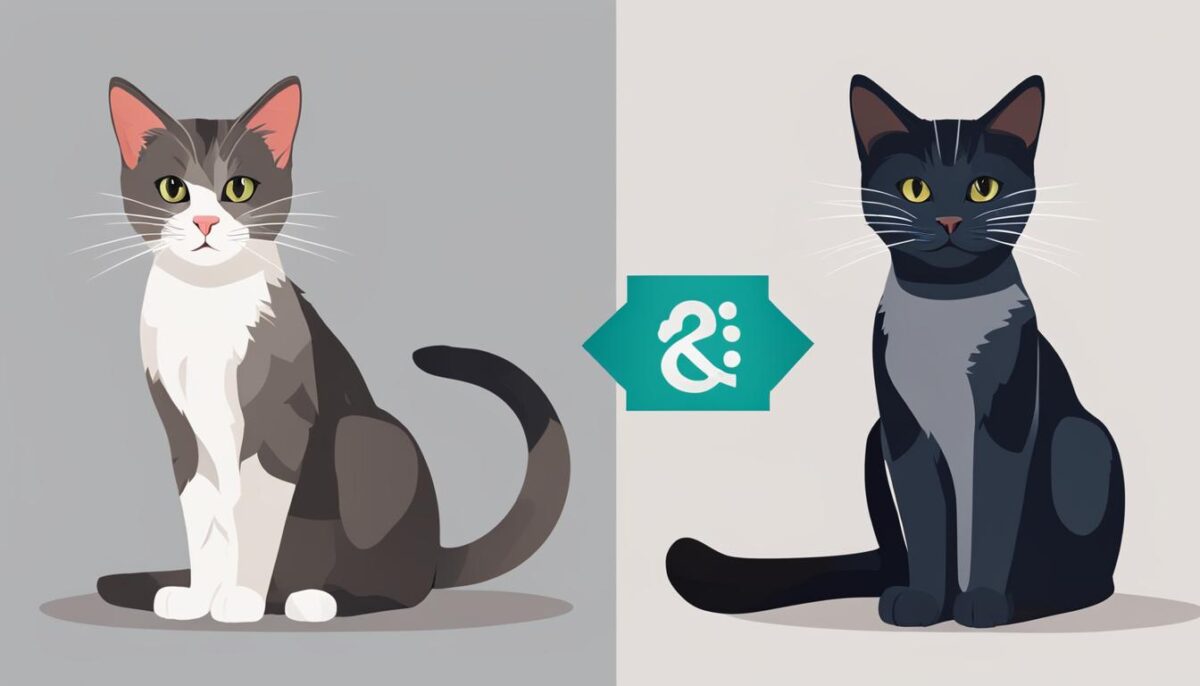Are you thinking about when is the best time to neuter a cat? You’re not alone. Figuring out the right cat neutering age is important for your kitty’s health. Neutering means your cat won’t have kittens. It’s a simple surgery that helps a lot. The vet will tell you that there’s a time when it’s best to do this. It’s often when your cat is about 6 months old. But it could be sooner, like at 4 months. This stops too many unwanted cats and keeps your pet happy and healthy. Getting your kitten fixed during the kitten spaying period is also about caring for all cats. It helps so that there aren’t too many kittens without homes. If you love cats and want to keep them safe, sterilizing cats is the way to go.
Remember, taking care of your cat’s health is a big deal. You can make sure they live a good life with you. Doctors who take care of animals agree that fixing your cat can help them stay fit and calm. It’s a big choice, but it’s good for pets.
Key Takeaways
- The best age to neuter a cat can be as early as 4 months.
- Waiting until 6 months might be better for some cats.
- Vets know the feline neutering procedure timing well.
- Neutering a cat is part of keeping your pet healthy.
- By sterilizing cats, you help stop too many homeless kittens.
- Talk to your vet about when is the right time for your kitten.
Understanding the Basics of Cat Neutering
Hey there! If you love your furry friend and want to take super good care of them, you might have heard about something called neutering. Let’s talk about what that is and why it’s helpful for your kitty!
What Is Neutering and How Does It Benefit Your Cat?
So, neutering is a small surgery done by a vet to help stop cats from making kittens. For boy cats, it means the vet takes out their testicles, and for girl cats, the vet might take out their ovaries or more. It’s a safe way to help your cat have a healthy life. It keeps your house calm without lots of little kitties running around and helps with some cat behaviors you might not like, like marking their territory or wandering too far from home.
The Shift in Professional Recommendations Over Time
Once upon a time, vets had all kinds of ideas about when to neuter cats. Now, they know better. They recommend doing it when your cat is about 4-6 months old. This change is super important! It helps keep the number of homeless kitties down. Many animal shelters do this, too, so there are fewer cats waiting for homes.
Being a responsible pet owner means taking care of your cat’s reproductive health. Neutering is a way to do that. And don’t worry, it’s really normal now and helps your kitty in so many ways.
Remember, taking this step means you’re helping to reduce cat homelessness and making sure your pet is as healthy as can be!
Evaluating the Right Time: When Can Cats Get Neutered
As a pet owner, choosing the correct neutering timing is essential. Most animal doctors agree that the optimal neutering age for your fuzzy friend is around five to six months old. At this age, kittens are old enough for pediatric spaying but young enough to avoid the risks of waiting too long, such as unexpected little ones adding to feline overpopulation control issues.
Some recommend kitten sterilization even earlier, at six to eight weeks, especially to help reduce the number of homeless cats. On the other hand, there are those who advise waiting until after the first heat cycle, which occurs between eight to twelve months. However, such delay could lead to more kittens without homes and contribute to overpopulation. Spaying and neutering not only help in managing the cat population but also support your pet’s health and well-being, reducing problematic behaviors.
Here’s some pet owner guidance on neutering timelines:
- Early Neutering (6-8 weeks): Often used in shelters to prevent future overpopulation.
- Typical Neutering (5-6 months): Recommended age for most household pets to balance health benefits and growth.
- Late Neutering (After first heat/8-12 months): Riskier due to potential for unwanted litters, but still beneficial for pet health.
Ultimately, the right choice may depend on your individual cat’s health and your vet’s recommendations. Spaying and neutering are not just about preventing kittens; they’re about providing a safe, calm life for your beloved cat.
Health Implications of Early Versus Later Neutering
When you’re thinking about the health benefits of neutering your kitty friend, it’s good to know about timing. Pediatric spaying impact is really positive for your cat. It means less chance of health troubles like breast tumors and no more risk of having kittens too early. This keeps both mama and baby cats safer and healthier.
Neutering your cat early also helps them have longer, happier lives. For boy cats, this means they won’t get testicular cancer. They’re also less likely to wander away or get into fights. No more spreading diseases to other cats, too. There are sterilization health risks, but they’re not common. We’re here to make sure you know both the good and not-so-good about cat reproductive health.
| Procedure Timing | Health Benefits | Possible Complications |
|---|---|---|
|
Pediatric Spaying/Neutering (Under 5 months) |
– Lowers cancer risks – Prevents early pregnancies – May lead to longer lifespan |
– Rare hormonal imbalances – Infrequent neutering complications |
|
Traditional Neutering (Over 5 months) |
– Reduces roaming and aggression – Prevents unwanted litters |
– Greater risk of spraying and marking – Chance of weight gain |
So, as you see, both early and later neutering come with their own pluses for animal longevity. But, being careful is key because you want your furry buddy to avoid any neutering complications. Choosing the best time to neuter your cat is like picking the best treat for them – it should be just right!
The Impact of Neutering on Cat Populations and Behavior
When you think about getting your kitten fixed, you’re making a big choice for their future and the well-being of other cats too. Neutering is not just a personal choice; it’s a step towards a bigger goal of keeping cat numbers at a good level and making sure our furry friends live happy, healthy lives.
Curbing Overpopulation and Unwanted Litters
By neutering your pet, you take a big step in reducing kitten births. This means fewer little ones without homes and less crowding in animal shelters. This can lead to a big drop in shelter intake reduction. So, when “kitten season,” the time when lots of kittens are born, rolls around, shelters might not be as packed as before. With fewer kittens needing homes, every cat has a better chance of finding a family that will love and take care of them.
Behavioral Changes Post-Neutering: What to Expect
After neutering, boy cats usually lose the urge to leave their home in search of girl cats, which leads to cat roaming prevention. It can also make them less likely to spray areas with pee to say ‘this is my place,’ known as territorial marking. Fighting with other cats often happens less too, which means a lot fewer boo-boos from cat fight reduction.
Girl cats benefit as well. Spaying stops the loud meowing and behavior that comes with being in heat, which is a big relief for you and your neighbors. Also, a spayed cat won’t be having any kittens, so you won’t have to worry about finding homes for new little ones.
So, remember, neutering your cat is not just about avoiding surprise kittens; it’s about giving your cat and others a chance at a safer and happier life. If everyone helps out, it means way fewer cats without homes and lots more love to go around for the cats we already have.
Conclusion
As a pet owner, loving your cat means taking steps to ensure their health and happiness. Neutering is an important part of embracing responsible pet care. It’s not just about preventing unwanted kittens; it’s about giving your cat a healthy life. When cats are fixed, they can avoid health issues and are less likely to show certain tough behaviors. Neutered cats tend to stay close to home and live safer lives.
Remember, fixing your cat is good for everyone. It means fewer little ones without homes and happier neighborhoods. This is part of our duty in community animal welfare. Always listen to veterinary health advice; your vet knows the best time to neuter your cat based on their health and age. They want what’s good for your cat, just like you do.
Finally, preventive pet care like spaying or neutering is a kind thing to do. It helps your furry friend and the animal family in your town. Talk to your vet and plan the right time to help your cat. Together, we can take care of our pets and give them the great lives they deserve.
FAQ
What is the best time to neuter a cat?
The best time to neuter a cat is typically around 4 to 6 months of age, which aligns with the cat’s developmental stage before reaching sexual maturity.
What are the benefits of spaying and neutering your cat?
Spaying and neutering can improve cat health by preventing certain cancers and infections, reducing unwanted behaviors such as roaming and fighting, and ultimately contributing to reducing cat homelessness.
Why have professional recommendations on neutering age changed?
Recommendations have shifted towards earlier neutering to prevent accidental breeding, help control feline overpopulation, and reduce certain health risks associated with cats that are not neutered.
When can cats get neutered? Is pediatric spaying safe?
Cats can be neutered as early as 4 to 5 months old, with pediatric spaying considered safe according to many veterinary health experts, helping to prevent the onset of reproductive health issues.
What are the health implications of neutering a cat too early or too late?
Early neutering is linked to health benefits such as a lower risk of certain cancers and negative behaviors, while late neutering may increase the chances of unwanted litters and contribute to overpopulation.
How does neutering impact cat populations and behavior?
Neutering helps control overpopulation by preventing unwanted litters and reduces behaviors like territorial marking, roaming, and aggression, which can also decrease the number of cats surrendered to shelters.
What behavioral changes can I expect after neutering my cat?
Post-neutering, you may notice a reduction in behaviors such as spraying, calling or howling during mating seasons, aggression, and the urge to roam, creating a calmer home environment.
How does neutering contribute to responsible pet ownership?
Neutering is a key aspect of responsible pet ownership as it helps prevent unwanted litters, promotes better health, and supports community animal welfare efforts by reducing stray populations.
Should I consult with a veterinarian about neutering my cat?
Yes, consulting with a veterinarian is crucial to receive personalized veterinary health advice and determine the optimal neutering age for your individual cat’s needs and health status.


